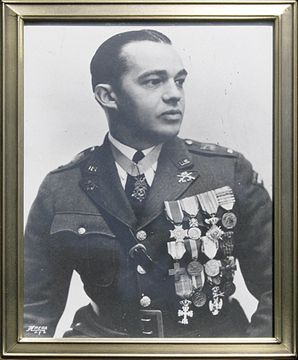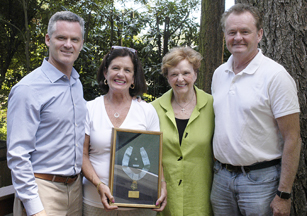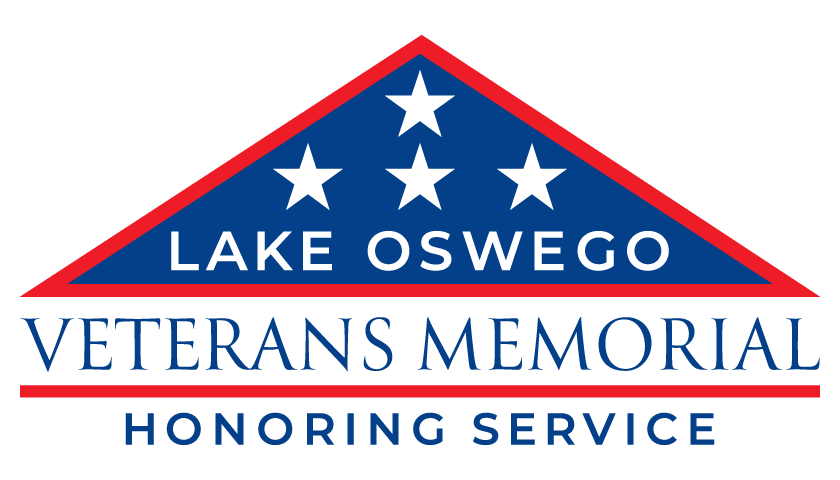“Legend of Sgt. O’Neill”
July 2017 | Written by Sam Stites | Lake Oswego Review
Lake Oswego family recalls the larger-than-life exploits of their grandfather, a WWI Medal of Honor recipient.

SUBMITTED PHOTO: JOHN HANAN II/JH2 DESIGN – Congressional Medal of Honor recipient Sgt. Richard W. O’Neill in full uniform, circa 1920. O’Neill received the award for his bravery in service to Allied Forces in 1918 during World War I.
Richard William O’Neill couldn’t possibly have known how greatly his life would be impacted by a single telegram that was intercepted by British intelligence officials in January 1917. The 18-year-old from New York City was one of 4.7 million American men to be shipped off to Europe following the interception of messages that incited public outrage over Germany’s courtship of Mexico during World War I and drew the United States into the conflict. Though young, O’Neill wasn’t some flat-footed recruit. Just two years earlier, he had been recruited by Maj. William “Wild Bill” Donovan to join his “Fighting 69th” Infantry Regiment, a ragtag brigade of tough, young Irishmen, many of whom Donovan plucked from the streets of New York himself. O’Neill fit the mold, and after basic training he followed Donovan to McAllen, Texas, on the U.S.-Mexico border to ward off attacks from an advancing Pancho Villa and his band of revolutionaries.
Following America’s declaration of war against Germany in April 1917, Donovan’s regiment was assigned to the 42nd “Rainbow” Infantry Division, a legion of troops gathered from 26 states and the District of Columbia and led by then-Col. Douglas MacArthur. The 42nd was activated in August, and by November their boots were on the ground on the western front of Belgium and France. Donovan, now-Sgt. O’Neill and the rest of the Fighting 69th trained with British and French forces, learning the basics of trench warfare. And over the next several months, they participated in four major operations in France that stretched across the Hindenburg Line. The German “Spring Offensive” had pushed the Allied Forces farther back than they’d been since 1914, and it was looking as though the Germans were on the verge of victory.
The Stuff of Legend
The next part of this story isn’t something you will find in history books. In fact, it’s the type of lore that only lives on through stories passed down from generation to generation. In this case, the tale is told by O’Neill’s grandchildren — Skip and Chris, both of Lake Oswego; and their sister Erin O’Neill-DiMarco, who lives in Birmingham, Mich. It includes Sgt. O’Neill and a moment of extraordinary bravery, a selfless act that helped Allied forces make a major push that eventually ended the war.
On July 30, 1918, near the Ourcq River in France, Sgt. O’Neill’s regiment was dwindling, having been greatly depleted by advancing German attacks and artillery fire from an unknown position. Sgt. O’Neill knew the Allies needed to find the location of the artillery before they could begin to push forward.
“My grandfather left their camp, crawled and fought through enemy fire to find out where the artillery was. In the process, he got shot numerous times, more than a dozen, and was hit with mustard gas and shrapnel,” says Skip O’Neill, who is now a Lake Oswego city councilor. “Despite all this, he crawled himself back to camp and gave them the map pinpointing where all this artillery was being shot from. It allowed the Allied forces to make a major move in this battle.”
Chris O’Neill, a Lake Oswego real estate broker, says his grandfather spent several months in the hospital before he rejoined his division and re-engaged the enemy — without his doctor’s permission. He was injured again, though, and when the Germans waved the white flag and called for an armistice to negotiate the terms of their surrender, Sgt. O’Neill was recovering back home. “They wanted to amputate his legs,” Skip O’Neill says. “But he wasn’t having that, so he slept with his .45 pistol.”
Sgt. O’Neill would come to learn that his actions saved thousands of French and American lives, a moment of heroism that the U.S. Government deemed worthy of its highest award, the Congressional Medal of Honor. “He literally had to leave the hospital at (Fordham University) and be brought to Fordham Field to receive the Medal of Honor,” Chris O’Neill says, “still suffering from his injuries.” According to the O’Neill family, Sgt. O’Neill is the only Medal of Honor recipient to receive his award from someone who was not a member of Congress or the President of the United States. Instead, his medal was presented by French Gen. Ferdinand Foch, the Supreme Allied Commander, who felt O’Neill’s actions at the battle near the Ourcq River were of special significance to the Allied victory over the Germans.
Not Done Yet
After being released from military care, Sgt. O’Neill married Estelle Johnson, whom he had fallen for before being shipped off to Europe. The couple settled in New York, and over the course of the next decade, Sgt. O’Neill slowly returned to civilian life. On July 16, 1927, the O’Neills welcomed William Donovan O’Neill into the world, named for Sgt. O’Neill’s friend and mentor, “Wild Bill” Donovan.
Sgt. O’Neill attended City College of New York and worked pouring concrete for the construction of the George Washington Bridge. He worked as a salesman before purchasing a liquor store near the Waldorf Astoria Hotel. The next several years were pretty quiet for O’Neill, but at the outbreak of World War II, a familiar face showed up at his door. “Wild Bill” Donovan came knocking once again, this time to recruit O’Neill to join the Office of Strategic Services, the wartime intelligence agency that served as the precursor for the Central Intelligence Agency.
Over the course of WWII, O’Neill worked as an OSS agent, sniffing out German spies along the New Jersey-New York-Massachusetts corridor. A handful of German-owned businesses were rumored to be in radio contact with Nazi U-boats off the Atlantic Coast, leading O’Neill into several scuffles with alleged spies throughout the war. When the OSS ceased operation in 1945 at the culmination of WWII, O’Neill’s military service was finally over. He received an offer to teach at the United States Military Academy at West Point, but passed on the opportunity. After a long career as a businessman and a lifetime of personal and professional achievement, Richard W. O’Neill passed away on April 9, 1982 at the age of 83.
A Lasting Legacy
In 1975, the barracks at Camp Smith in Peekskill, N.Y., were named O’Neill Hall in his honor. His legacy is still remembered by his three grandchildren and by his daughter-in-law, Mary Ann O’Neill. As a retired Army sergeant, O’Neill fought for the improvement of veteran’s rights. Having firsthand experience as a wounded WWI veteran, he understood the need for ongoing support for veterans’ health care and worked closely with Douglas MacArthur and President Dwight D. Eisenhower to improve the Office of Veterans Affairs.
As a young girl, Erin O’Neill-DiMarco recalls her grandfather’s road to recovery from the wounds he received in WWI as being a road that never really ended. “He used to sit in the bathtub in this hot, hot bath, and pieces of shrapnel would ooze out of his legs,” she says.
While in active service, O’Neill was a Golden Gloves boxer and at one point fought an exhibition match against world heavyweight champion Gene Tunney. “He didn’t win,” Chris O’Neill says with a laugh. “It was more for show to entertain the troops.”

SUBMITTED PHOTO: JOHN HANAN II/JH2 DESIGN – Sgt. Richard O’Neill’s Congressional Medal of Honor. O’Neill was awarded the medal by French Gen. Ferdinand Foch, the Supreme Allied Commander during World War I.
The O’Neill siblings remember their grandfather as a gentle and kind man, one who never used foul language or spoke ill of others. He served as president of the Republican Party in New York for a short time, and attended nearly every presidential inauguration during his lifetime. “I remember the invitations were so beautiful, and my grandmother had all these gorgeous gowns she would wear to the inaugural balls. He even had a handwritten note from John. F Kennedy thanking him for attending,” O’Neill-DiMarco says.
Today, O’Neill’s grandsons are carrying on his legacy of service and leadership. Skip, a local builder, is currently serving his second term as a Lake Oswego city councilor. And Chris, a local real estate broker, was honored by the City in 2012 for saving a young boy from a vehicle teetering on the edge of Oswego Lake. “(My grandfather) was a very soft-spoken person, but you could feel his strength at the same time. He didn’t like war, but he was willing to protect those that needed to be protected,” Skip O’Neill says. “I think that’s one of the greatest assets of our military men and women — you see their level of commitment to protecting those who need protection. “He gave me a very high respect for members of our military,” O’Neill adds. “They’re usually the same individuals who become police officers and firefighters. They have that calling in life.”
